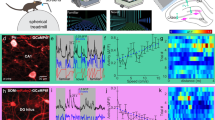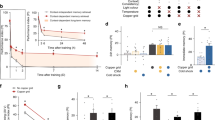Abstract
AN important problem in studying the physiological basis of memory is to determine its location. Protozoa offer the obvious advantage of confining the site(s) to a volume no more than 1 mm3. If nuclei and cytoplasm are removed from them before behavioural testing, the search for any memory trace is further limited.
This is a preview of subscription content, access via your institution
Access options
Subscribe to this journal
Receive 51 print issues and online access
$199.00 per year
only $3.90 per issue
Buy this article
- Purchase on Springer Link
- Instant access to full article PDF
Prices may be subject to local taxes which are calculated during checkout
Similar content being viewed by others
References
Seshacher, B. R., Acta Protozoologica, 3, 337 (1965).
Allen, S. L., in Chemical Zoology, 1 (edit. by Kidder, G. W.) (Academic Press, New York, 1967).
Applewhite, P. B., Nature, 219, 91 (1968).
Applewhite, P. B., Nature, 217, 287 (1968).
Lowry, O. H., Rosebrough, N. J., Farr, A. L., and Randall, R. J., J. Biol. Chem., 193, 265 (1951).
Lehman, W., and Rebhun, L., J. Cell Biol., 39, 79A (1968).
Author information
Authors and Affiliations
Rights and permissions
About this article
Cite this article
APPLEWHITE, P., LAPAN, E. & GARDNER, F. Protozoan Habituation Learning after Loss of Macronuclei and Cytoplasm. Nature 222, 491–492 (1969). https://doi.org/10.1038/222491a0
Received:
Issue Date:
DOI: https://doi.org/10.1038/222491a0
This article is cited by
-
Theory of Protozoan Habituation
Nature New Biology (1971)
Comments
By submitting a comment you agree to abide by our Terms and Community Guidelines. If you find something abusive or that does not comply with our terms or guidelines please flag it as inappropriate.



